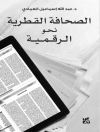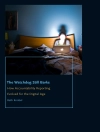When we encounter a news story, why do we accept its version of events? Why do we even recognize it as news? A complicated set of cultural, structural, and technological relationships inform this interaction, and Journalistic Authority provides a relational theory for explaining how journalists attain authority. The book argues that authority is not a thing to be possessed or lost, but a relationship arising in the connections between those laying claim to being an authority and those who assent to it.
Matt Carlson examines the practices journalists use to legitimate their work: professional orientation, development of specific news forms, and the personal narratives they circulate to support a privileged social place. He then considers journalists’ relationships with the audiences, sources, technologies, and critics that shape journalistic authority in the contemporary media environment. Carlson argues that journalistic authority is always the product of complex and variable relationships. Journalistic Authority weaves together journalists’ relationships with their audiences, sources, technologies, and critics to present a new model for understanding journalism while advocating for practices we need in an age of fake news and shifting norms.
Jadual kandungan
Acknowledgments
Introduction: The Many Relationships of Journalism
Part I. Foundations of Journalistic Authority
1. Professionalism as Privilege and Distance: Journalistic Identity
2. Texts and Textual Authority: Forms of Journalism
3. Telling Stories About Themselves: Journalism’s Narratives
Part II. Journalistic Authority in Context
4. Recognizing Journalistic Authority: The Public’s Opinion
5. Legitimating Knowledge Through Knowers: News Sources
6. Mediating Authority: The Technologies of Journalism
7. Challenging Journalistic Authority: The Role of Media Criticism
Conclusion: The Politics of Journalistic Authority
Notes
Index
Mengenai Pengarang
Matt Carlson is associate professor of communication at Saint Louis University. He is author of
On the Condition of Anonymity: Unnamed Sources and the Battle for Journalism (2011) and coeditor of
Boundaries of Journalism: Professionalism, Practices and Participation (2015) and
Journalists, Sources, and Credibility: New Perspectives (2010).












